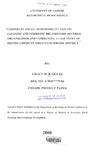| dc.description.abstract | Corporate Social Responsibility (CSR) emerged from a realisation among
transnational corporations of the need to account for and redress their adverse impact
on society: specifically, on human rights, labour practices, and the environment. The
main objective was to evaluate how corporate social responsibility (CSR) is
contextually understood and practiced by BAT. The specific objectives were to
identify the origin and basis of practicing Corporate Social Responsibility (CSR) by
BAT; to determine how members of the Mbeere District perceive CSR by BAT; to
examine the factors taken into account in choosing CSR activities by BAT.
This led to the understanding ofthe relationship between BAT and Mbeere district.
Industrialization, modernization and globalization are the factors that led to the global
drive towards greater awareness of social responsibility. As much as CSR is a current
topical issue, there is concern that CSR in Kenya is a very new concept and thus not
well understood by many hence the scarcity of literature. To guide this study the
theoretical framework employed was bureaucracy theory and specifically goal
displacement, exchange theory on the basis of corporate exchanging with the
communities in which they operate in a relationship that is marked with symbiosis
and at times parasitism and lastly the rational choice theory which assumes that all
individuals are aware of all possible choices.
The methodology approach utilized in this study was qualitative and quantitative.
Purposive and snowball sampling designs were used
The study was carried out in Mbeere district where I sought to investigate what CSR
activities had been carried out by BAT on that area. The findings of the study were
that many members of the community were not aware of the assistance accorded by
BAT though for those who were aware they were happy of what had been done but
felt that firm could provide much more. On the other hand, BAT's choice of CSR
activities is determined by the both internal and external factors.
The study shows that the society requires the assistance from the corporate bodies for
its development for instance boosting education, health and environment. This study
recommends the following; that BAT needs to ensure that whatever projects
undertaken are sustainable and capture the need of the specific society; BAT to solicit
employee suggestions regarding CSR initiatives; more comparative, qualitative
research on CSR should be undertaken by BAT. | en |

